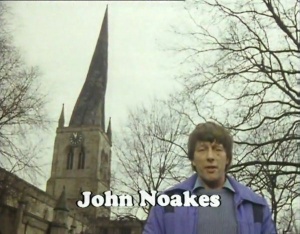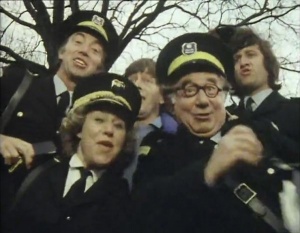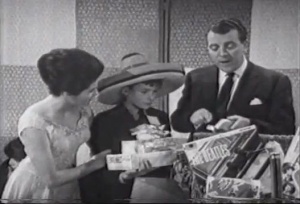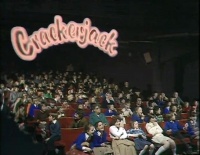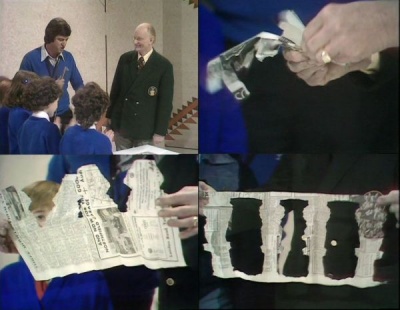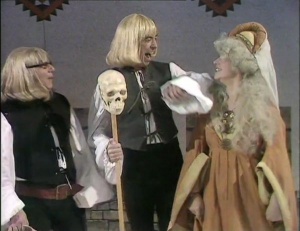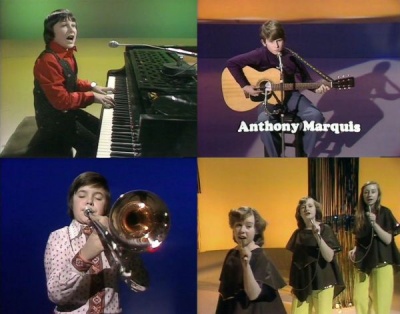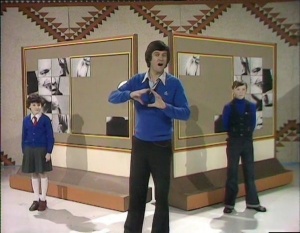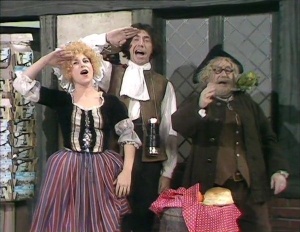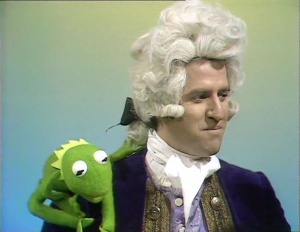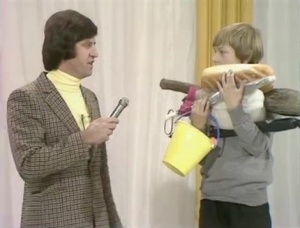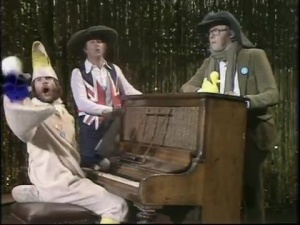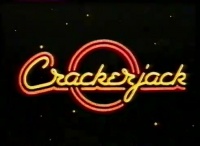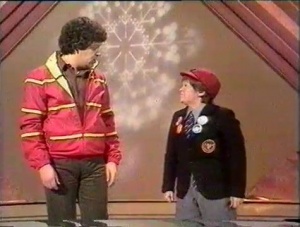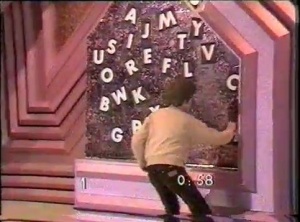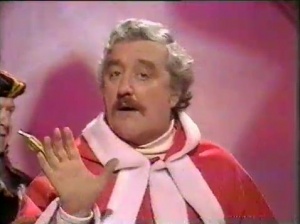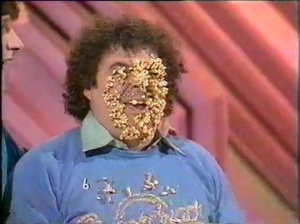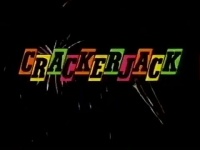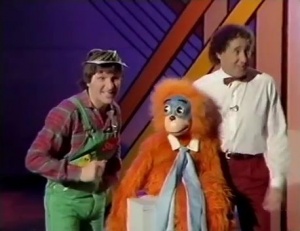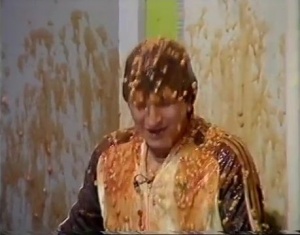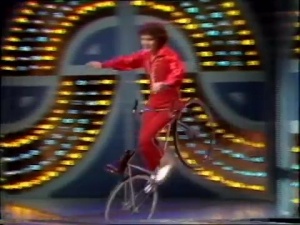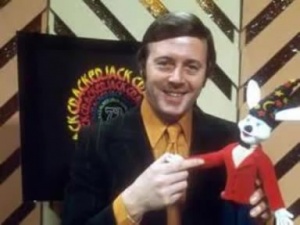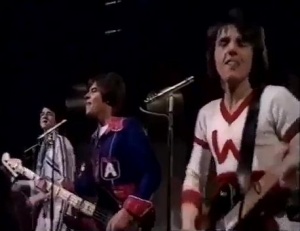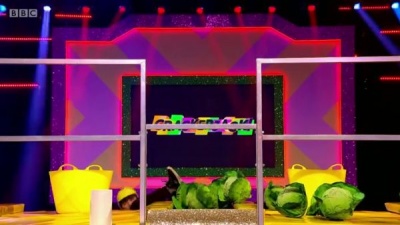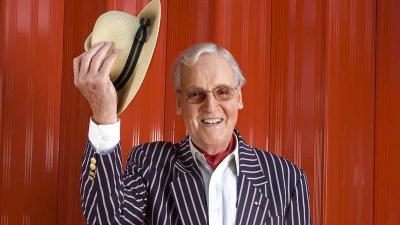Weaver's Week 2020-02-09
(Created page with 'Last week | Weaver's Week Index | Next week <div class=image> [[File:Crackerjack john noakes.jpg|300p…')
Current revision as of 11:33, 9 February 2020
Last week | Weaver's Week Index | Next week
January 1978, and Blue Peter star John Noakes is reporting on the crooked church spire in Chesterfield. He breaks off from his script, because he sees some traffic wardens around his car. Parking tickets? Worse than that, it's Peter Glaze, Bernie Clifton, Ed Stewart, and Jan Hunt. They have three things to tell Noakes:
It's Friday.
It's five-to-five.
Contents |
Crackerjack
Children's Department for BBC Television Service, from 18 October 1955
Based on an idea from Johnny Downes, Crackerjack was a variety show for children. Eamonn Andrews hosted the original editions, live from the King's Theatre on Hammersmith Road in London. Crackerjack was shown every second Wednesday afternoon from September to March. Every second Wednesday? Yes; Eamonn's Playbox show filled the other weeks. Being a fortnightly show allowed Crackerjack some time to rehearse, and more importantly to write new material. They shifted to Thursday in 1959, and moved from the aegis of the Children's Department to BBC Light Entertainment. This was a show made by grown-ups for children.
Leslie Crowther took the reigns in 1964, at which point Crackerjack moved to the BBC Television Theatre on Hammersmith Green, adopted its hallowed Friday spot, and ran every week for almost half the year. Michael Aspel succeeded Leslie Crowther in 1968, and during his tenure the show took winter 1970-71 off – replacements included The Basil Brush Show, another Johnny Downes programme. Crackerjack came back in early 1972 for the spring only. Michael Aspel was replaced by Ed Stewart in 1975.
Much has been written about the "glory days" of Crackerjack, the internet is full of hazy nostalgic memories of Leslie Crowther and Peter Glaze and Michael Aspel. We're going to address a subtly different question: why did Crackerjack come off air in 1984? Our story starts some years earlier...
Sample episode 1: 6 January 1978
With the briefest of title cards (literally the name and a shot of the audience), we're into the opening pop number. "If paradise is half as nice" gets a polite pub-rock cover by Rosetta Stone.
Ed Stewart is the host, and he takes us through the first game. Four girls from one school have been selected. They'll see Eric tear bits off of folded newspaper, and when the paper's unfolded, they'll form little man figures.
Our expert has had a lot of practice, and can make the figures in 45 seconds flat. The girls, they also get 45 seconds. Their efforts are not quite as good, and the best wins through. The challenge is clearly inspired by some of the work done on The Generation Game: here is something difficult, watch it done well, now do it yourself. But it's a quiet challenge, we're just watching people tear small strips of newspaper. It doesn't make for particularly good television.
Everyone gets Crackerjack pencil sets, a propelling pencil in a nifty presentation box. The show's prizes have to be earned. John Bercow, a schoolboy from Barnet, earned his pencil in March 1975. The Controller of BBC1 didn't get one, there's a strict rule against freebies.
Now for something completely different. Peter Glaze, who is part of the Crackerjack furniture. He made his debut on the show in 1960, (though missed the 1972 series) and here introduces an "improving" and "educational" piece on Shakespeare's Hamlet. Peter Glaze was the hero of Crackerjack, the perfect foil for his taller comedy partner. Whether that was Leslie Crowther or Don MacLean, Peter was the short man who would set up the comedy lines for the other man to knock down. He was the slightly pompous duffer to be duffed up.
After a few moments, Peter sees another skull pop up behind him. It's Bernie Clifton, everyone! A relative newcomer to Crackerjack, Bernie was in his second series, but it felt like he had been around since the series began. The sketch develops, asking why Shakespeare was so dull, and Jan Hunt (in her third series) joins Pete and Bern for a musical number.
That was rather charming. Now, what challenge will four boys from one school face? They'll see Eric tear bits off of folded newspaper, and when the paper's unfolded, they'll form little man figures.
Our expert has had a lot of practice, and can make the figures in 45 seconds flat. The lads, they also get 45 seconds. Their efforts are not quite as good, and the best wins through. This challenge is oddly familiar, it feels like we've seen this before, about ten minutes ago. The secret of comedy might be repetition, but this ain't comedy.
As if we weren't bored enough already, it's time for Young Entertainers, a proper little show-within-a-show. Each of the BBC's 15 regional studios have picked out a young performer from their region, and during the next few weeks, they'll get two minutes to perform on Crackerjack. A singer at a piano, a ventriloquist act, a lad strumming a guitar, a trombonist, and a singing trio. The studio audience will vote for their winner, and Ed will tell us who that is next week.
This section is entirely worthy, it's public service broadcasting at its most public service. And it's a clear drop in quality compared to the rest of the programme – the pop act who started the show, comedians Pete 'n' Bern 'n' Jan are seasoned professionals. These are enthusiastic children, given two minutes to make a decent little number, mostly in tune and with raw promise. The show-within-a-show gets a separate production credit, Colin Farnell made the best out of an unpromising idea.
Young Entertainers would eventually migrate to Saturday mornings, where it became one item in a much longer show. The Saturday Superstore Search for a Superstar gave us Claire and Friends, a recording contract and top 20 hit. Helen and Damien are fondly remembered by other viewers. But we digress...
Back to Crackerjack, and there's a filmed piece where Bernie and Pete try – and fail – to work in a garage. It's silent film comedy, harking back to the Keystone Kops era. Alan J W Bell directed many of these pieces, you might know him from Last of the Summer Wine. This film was the first thing shown to the audience, it helped to warm them up, and provided some laughter to drop in during the edit.
Then it's time for the contest final. Our two contestants have a picture of someone famous, cut up into twelve segments. A couple of segments are in place already. The task is to re-assemble the picture, identify the famous person, burst a balloon, and tell Ed Stewart. Simple, right?
Wrong. Our two contestants have absolutely no idea what they're doing, so we get a long time of the players just picking up the pieces, holding them, and not getting very far at all. Have the producers not bothered to test this game? Did they not have a dry run, ask a couple of passing ten-year-old children to do this using bits of paper?
Eventually, Ed steps in to save this from complete disaster. "Can you recognise the star from the chopped up picture?" he asks. But even then, the players can't burst the balloons – no-one has told them that there's a pin by the balloons. The answer, as any child of January 1978 would know, is singer and actor David Soul. Well done if you got that at home. A music centre for our winner, a portable tape player for our loser, "so you can listen to Junior Choice" says Ed.
"Well, I'm afraid it's finale time," says Ed. Really, he does. Apologises in advance for the comedy skit to come. Is the best of the show really behind us, even though the last 15 minutes have been pretty dire entertainment? Does he want us to turn over and watch Regional Variations on the other side?
Mercifully not. Peter and Jan and Bernie riff off Treasure Island, the loose setting allows them to make some high-quality comedy. "Why is there a cat on his shoulder"? "Coz he likes doing impressions." "Why do they call you Short John Silver?" "My mummy told me not to be long."
During the sketch, our heroes riff off Status Quo's recent hit "Rocking all over the world", and are later joined by Ed Stewart. Why does the treasure map look like a tea towel? Why does he have Kermit The Frog on his shoulder? "Coz he likes doing impressions". As is traditional, Ed Stewart comes on – in full costume – to break up the fun. And that's about that.
By December 1978, there's been a subtle change of emphasis. Robin Nash has stopped producing the show, replaced by Johnny Downes. Pop comes from Mud, and guests The Goodies perform a comedy skit of their own – and they'll join in the finale sketch.
The games are still a bit ropey – literally in the case of the boys, who are to untie knots in a length of rope. A more televisual game for the girls, jump up and down to burst balloons over their head.
And they've struck a deal with Eamonn Andrews to bring back Double or Drop. The two winners are joined by last week's Double or Drop champion to play the game. Prize boxes for a right answer to the general knowledge question, cabbages for a wrong answer or for dropping one of the boxes, and three cabbages takes you out of the game. The overall winner picks their prize from a stack of prizes.
Double or Drop was devised by Eamonn Andrews when he hosted Crackerjack. When he left the show he took the format with him, and it wouldn't return until they struck a deal in the late 70s. Even in 2020, Eamonn still gets his name in the credits, and we thought "Created by – Bill Wright" on Mastermind was going to be the oldest credit of the year.
On this show, Double or Drop goes on a bit, and Ed has to bring out a tie-break question. Though pre-recorded, Crackerjack isn't heavily edited, and they won't cut things down to time. The finale, sadly, is absent from the episode we've got. That doesn't stop us from seeing more of Glaze and Clifton, all "doh!" and superb reactions.
While it's dangerous to generalise from two sample episodes, this column is (just!) old enough to remember the Stewpot era of Crackerjack. Don't recall the details, only that there were some brilliant comedy bits, and most of the rest was insufferable rubbish. Crackerjack needed some major surgery
It seems that other people in the Children's Department shared our view, and brought out the night of the long knives. Michael Hurll was brought in as producer, and he sacked absolutely everyone else. Peter Glaze, gone after 20 years. Bernie Clifton, gone after 2 years. Jan Hunt, also off the show. Ed Stewart told to ed off to Junior Choice, where he'll be shortly replaced by the triple-headed team Tony Blackburn, Keith Chegwin, and Maggie Philbin.
From the viewpoint of BBC archivists of the 1960s and 1970s, these shows were trivial and ephemeral, taped on Tuesday and broadcast on Friday, with no prospect of ever being seen again. They might clip out some of the more well-received sketches for a compilation show, and keep a few sample episodes for posterity, but that was quite sufficient. Why fill shelves with entire canisters of original entertainment like Crackerjack that will never be seen again, especially when they need the space for an entire run of Panorama that is felt to be worthy but will never be seen again?
Sample episode 2: 19 December 1980
New stars for the new decade? Well, it's someone different. The first name on the billing is Ian and Janette: The Krankies. Show host Stu Francis takes second billing. While Jan Hunt was an equal part of the comedy team, Jan Michelle was a near-equal host, except her part is clearly run down in favour of Stu Francis. Welcome to the "progressive" 1980s.
The Krankies are first up, telling a few of their jokes. Not particularly funny ones, even by the standards of Crackerjack. The Krankies schtick was that Janette played Jimmie, a cheeky schoolboy who doesn't want to be at school; husband Ian played Jimmie's father. It's a character fashioned after Dennis the Menace in The Beano. But after just a couple of one-liners, the Krankies sing their new record, "Fandabidozi", doubtless in record stores near you right now. Probably in the charity bin, twelve for £1.
The only game they played this week – indeed, the only game they played this series – was Take a Letter. Our contestant runs up to a board of letters, takes one, and brings it back to Stu. He will either ask a general knowledge question, or call for a stunt. Jan controls the stunts, put on a wig, do an impression, use your mouth to get a marshmallow out of a vat of custard / puffed wheat / jelly. 90 seconds for each player, the higher score wins.
What can we tell about Take a Letter? It's licensed from Lyle McCabe Productions, the people who came up with Paul Daniels' various quiz formats. It's a fair quiz, each board has 13 questions and 13 "stunt" calls. The stunts were arranged by the producers in order, to be equitable between the players – if one had to wear clown pants from early on, the other would don clown shoes.
Stu puts his own spin on proceedings. Rather than toss a coin to decide who goes first, he asks one player to "name a number between 1 and 10." Only if it's the one he's thinking of will that player go first. Frankly, it doesn't matter who goes first. Ties are broken in a similar style to Double or Drop, Stu asks a single question, first to shout out the answer wins. File both of these under "acceptable in the 80s", and wouldn't be tolerated now.
Something they might tolerate now: Bernard Cribbins and his skiffle band singing a comedy song. OK, it's about a traffic warden, which wasn't particularly on-target for the child audience in 1980, but Bernard could roll up today and have the audience eating out of the palm of his hand.
Another thing they could bring back: Good News Bad News. It's a section of quickfire gags, to a formula.
Good news! I've just invented a car that runs on treacle.
Bad news! I keep getting stuck in traffic jams.
Thanks to Layla Gordon from Liverpool, aged 5, for that joke. Good News Bad News was the part of the show involving children at home. Most of the lines came from the audience, the winners would get their own Crackerjack pen sets. While we don't have the massive original comedy from the last decade, we do still have some fun here.
Another round of Take a Letter finds another finalist, then the star guest – impressionist Roger de Courcey and Nookie the bear. It's surprising that they only get a few minutes of the show, they could have had a longer turn.
The show ends with a ten-minute pantomime skit, in the traditional finale. Before that, the final of Take a Letter, with some celebrity guests. It's only Little and Large, everyone! The comedians have a regular primetime show on BBC1, they're amongst the biggest draws in family comedy. And, though it's not mentioned on this edition, they got their big break on Crackerjack. When the show returned after a year away, in early 1972, they were the resident comedians while Michael Aspel held the show together.
Little and Large weren't the only famed Crackerjack alumni. Ronnie Corbett, the shorter of the Two Ronnies, was the diminutive comic in the 1950s, not that this engagement warrants mention in his autobiography. Pearl Carr and Teddy Johnson put in a couple of years, while not representing the BBC at the Eurovision Song Contest. Another Crackerjack star, Elaine Paige, went on to have a singing career of her own.
Sample episode 3: 19 November 1982
By 1982, we find there's a larger group of regulars. Keith Harris and Orville would promote themselves into the nation's consciousness. Chas and Dave, the professional cockneys, re-recorded the show's theme tune and appeared more often than not.
On this programme, Stu is joined by Keith Harris, but (mercifully) not the Krankies. There are two pop performances, from Talk Talk and from Toyah Willcox. Keith will bring out both Orville the duck and Cuddles the monkey, and the guest entertainment comes from Pepe and Friends, a creepy puppet disco.
The Celebrity Final of Take a Letter is – again – with a pair of celebrities. That's why it's the celebrity final, it's got celebrities in it. But after each child-and-celeb team has run their 90 seconds, we're into a new element, Take a Chance. Stu and the celebrity would sit in one of three coloured chairs, beneath a concealed vat of something. The celebrity is playing for their team-mate, Stu for the opponent.
The child reads a question off a card, and the players shout out their answers. First one to get it right wins the points for their side, and the other gets covered in whatever horribleness is above their head. Tomatoes. Creepy crawlies. Salad cream. Baked beans. A solid slice of BBC tea. Just some of the things that could be landing on your head in the Crackerjack finale. (No, it's not real grub. They're not going to waste perfectly edible real food. That's why they used BBC tea.)
It's 1982, and gunge has come to children's television. It's a shortcut to get a reaction, because every child likes to see grown-ups covered in something slimy and gunky. Every child likes to be covered in gunge themselves, it's a transgression against baths and soap and being prim and proper and presentable. Because it's so potent, gunge can help a poor show to conceal its flaws. And if a show's reaching for the gunge in the first minute, what is it trying to cover up?
Stu's support in 1983 and 1984 were – effectively – one or two of Keith and Orville, Chas and Dave, magician The Great Soprendo, and quiz nemesis Basil Brush. Changes in the schedule for 1984 meant that Crackerjack now began at 5.15 on Friday night, running up to the weather forecast at 5.58.
Sample episode 4: 25 October 1984
Another Stu Francis routine, another "comedy" misunderstanding involving Orville and fancy dress. The Kane Gang perform their new single "Respect yourself". There's a continuity error, Stu has changed from a red shirt to a blue-and-yellow t-shirt.
Our first game is "It's In the Box". 60 seconds to reach through a paper burst, grab tokens – cubes or spheres, worth between 1 and 3 points. Reach into the unknown (glitter, or slime, or "worms", or a thick slice of BBC Tea), and bring back a token. More points mean harder questions, and each player picks a joker (yellow circle, orange square, or some combination thereof). Most points in the tubes after a minute goes through to the Celebrity Final.
Barry Lappy performs stunts on a bicycle. Another round of "It's In the Box". The Adventures perform their new single, "Send my heart". Keith Harris and Cuddles perform a comedy routine, it passes the six laugh test. Stu has changed again, into a sky blue tracksuit, probably borrowed from David Icke.
And we've reached the Celebrity Final, where our winners are joined by Liz Hobbs (waterski champion) and Gary Mabbutt (footballer). Forgotten names now, but these were decent bookings for 1984. Same procedure as in 1982, questions and stunts for 90 seconds, almost drowned out by cheering from the crowd. Many of the stunts are "get Stu Francis mucky".
And then Crackerjack came to an end. The Children's Department wanted to concentrate its resources in other areas – The Box of Delights doesn't come cheap – and found its budgets squeezed so that the BBC could make a full daytime schedule. Terry Wogan had a block booking of the BBC Television Theatre, his three-times-a-week chat show would make it impossible for any other programme to use the hallowed hall.
Ultimately, Crackerjack was no longer a varied variety show. Just four years prior, Crackerjack had been 30% games, 10% pop, and 60% laughter. It had been full of original material, corny jokes coming out of its ears; now it was formulaic and full of pop. Crackerjack in 1982 was 40% Take a Letter, 30% pop music, and 30% comedy; by 1984, "comedy" was "gunge". And, unless it's a huge star, children are less interested in pop music than you might think. The Bay City Rollers, they're a good booking for 1975. Toyah Willcox, very decent for 1982. The Adventures? One-hit wonders, if we wanted that, we'd be watching The Tube.
The television environment had changed, too. Crackerjack was no longer the big attraction of the weekend. The Saturday morning shows – Swap Shop and Saturday Superstore – drew the most famous entertainment names. Stars had room to perform a longer set on live television, and could answer calls from their fans on the phone. Crackerjack shunted everyone into four-minute slots, and you couldn't call Orville, even if you wanted to.
Crackerjack had subsisted for a few years on goodwill: mums and dads who grew up with the show when it was funny, and figured that the mix headed by Stu Francis was what their children wanted. Perhaps they were looking back on their own childhood through rose-tinted glasses. To children – such as this column – Crackerjack was someone else's idea of what children would find entertaining.
That's why Crackerjack fell, and Blue Peter survived. Biddy Baxter could prove that her audience was engaged and took action, she could drop sacks of post on the Children's Commissioner's tootsies. Whether it's creating stamps, designing an outfit for Peter Duncan or saving Cambodia, Blue Peter was relevant and real to its audience. Crackerjack wasn't, and it was time to go.
Crackerjack came off air on 21 December 1984. We would not see its like again.
Except we would, as next week's Week will discuss.
In other news...
A moment of silence, as the death was announced of Nicholas Parsons, broadcasting legend.
The televotes are in! The National Television Awards were shown on 28 January, and the game show winners were:
- Talent Show – Strictly Come Dancing
- The Bruce Forsyth Entertainment Award – I'm a Celebrity... Get Me Out of Here!
- TV Presenter – Ant and Dec
- Challenge Show – Bake Off
- TV Judge – David Walliams
The jury votes are in! Broadcast Magazine presented its industry awards on 5 February, and the game show winners were:
- Best Documentary Series – Jade, the profile of Jade Goody
- Best Entertainment Programme – Love Island
ITV has confirmed that there won't be a new series of Alien Fun Capsule. The pointless panel game ran for three series on Saturday evenings. They've also said that The X Factor will be "rested" for a year; the show, where contestants direct aspiring singers, has clogged up the schedule since 2004. Still, it leaves plenty of room for another series of Stars in Their Eyes.
A quiet week for new programmes, Hunted (C4, Thu) the main attraction. Celebrity Mastermind resumes next Saturday, and Pointless Celebrities has some Experts (both BBC1). It's the last in the "present" series of The Masked Singer (ITV).
Photo credits: BBC, BBC Children's Productions.

